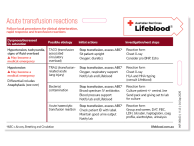Severe allergic reactions
When to suspect this adverse reaction
Usually begin within a few seconds or minutes after the start of the transfusion. May be fatal.
Anaphylactic reactions are characterised by rapidly developing Airway and/or Breathing and/or Circulation problems.
Patients can present with a sudden onset of severe hypotension, dyspnoea, cough, bronchospasm (respiratory distress, stridor and wheezing), laryngospasm, angioedema, urticaria, nausea, abdominal cramps, vomiting, diarrhoea, shock and/or loss of consciousness.
Incidence 1:20,000 to 1:50,000 transfusions.
Usual causes
The following mechanisms have been implicated in anaphylactic reactions:
- IgA-deficient patients who have anti-IgA antibodies. Although IgA deficiency is not uncommon, fortunately most do not develop anti-IgA antibodies.
- Patient antibodies to plasma proteins (such as IgG, albumin, haptoglobin, transferrin, C3, C4 or cytokines).
- Transfusing an allergen to a sensitised patient (e.g. penicillin or nuts eaten by a donor).
- Rarely, the transfusion of donor IgE antibodies (to drugs, food, etc.) reacting with an allergen present in the recipient.
What to do
Anaphylaxis may become a medical emergency and can be fatal.
STOP the transfusion immediately and follow other steps for managing suspected transfusion reactions.
Maintain an open airway and immediate intervention with intramuscular (IM) adrenaline according to your local health service guidelines for anaphylaxis/severe allergic reactions.
Administer high flow oxygen, and, consider nebulised bronchodilator (if wheeze is present).
Maintain intravenous (IV) line with IV fluids and support blood pressure.
Alert your Medical Emergency Team (MET) according to local health service protocol for ongoing management and expert evaluation of inotropic and respiratory support.
The benefit of corticosteroids in anaphylaxis is unproven.
Consult a haematologist or transfusion medicine specialist before administering additional blood components.
To manage recurrent anaphylaxis, consider the following options:
- Perform further transfusions in a clinical area with resuscitation facilities.
- Consider pre-medication with antihistamine.
- Transfusion of washed red cells or platelets. (Consult with a haematologist or transfusion medicine specialist for provision of washed red cells).
- If the patient is IgA-deficient with anti-IgA, the use of IgA-deficient or washed blood components is recommended in elective situations. However, if urgent, life-saving transfusion is needed where IgA deficient or washed blood component are not immediately available, standard blood component should be transfused with direct observation in a clinical area with the skills and capacity to manage severe allergic reactions. .
Investigations
Anaphylaxis usually has a typical clinical presentation. Occasionally the clinical picture suggests a differential diagnosis of an acute haemolytic reaction, TRALI or TACO with further investigations to exclude as necessary.
For anaphylaxis work-up check patient’s:
- pretransfusion IgA levels,
- haptoglobin
- serial mast cell tryptase,
- anti-IgA antibodies if IgA deficiency confirmed (IgA < 0.07 g/L).
Updated June 2025

